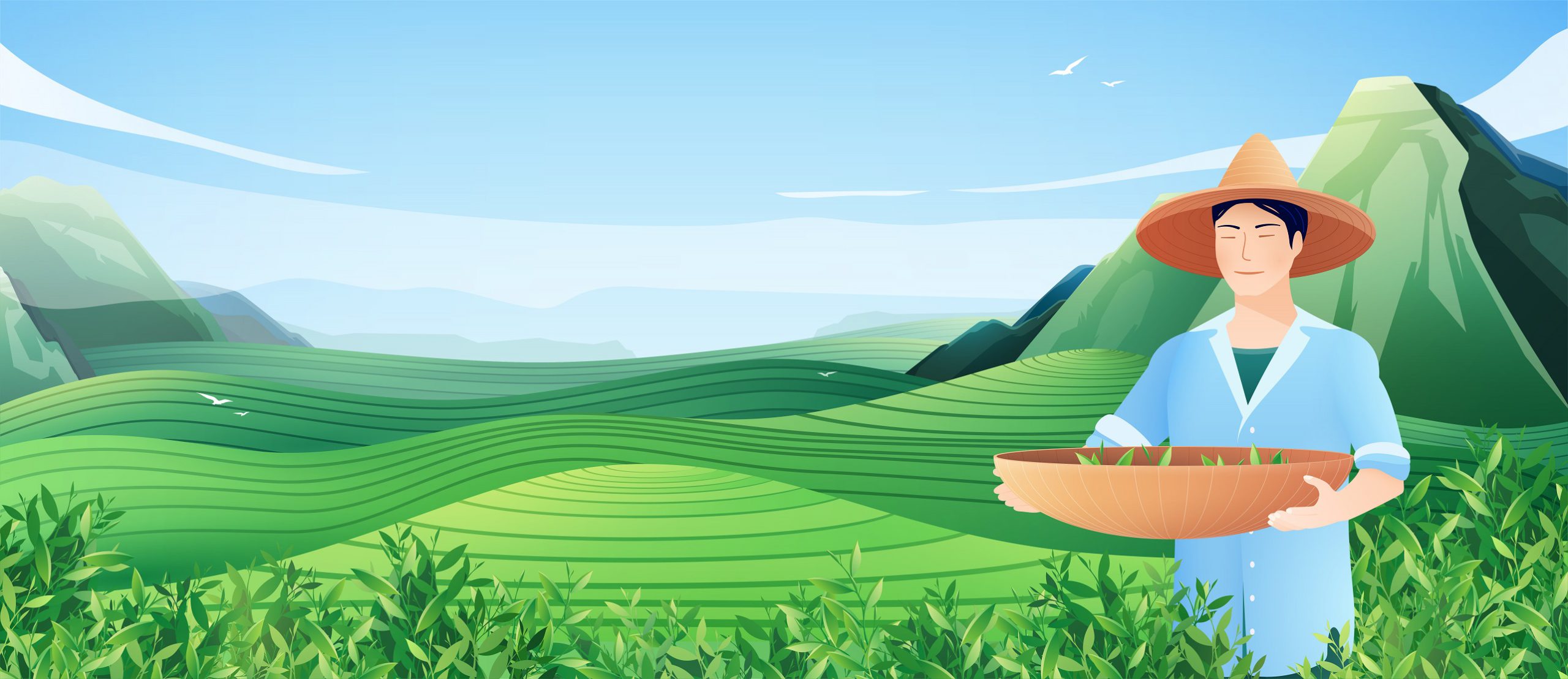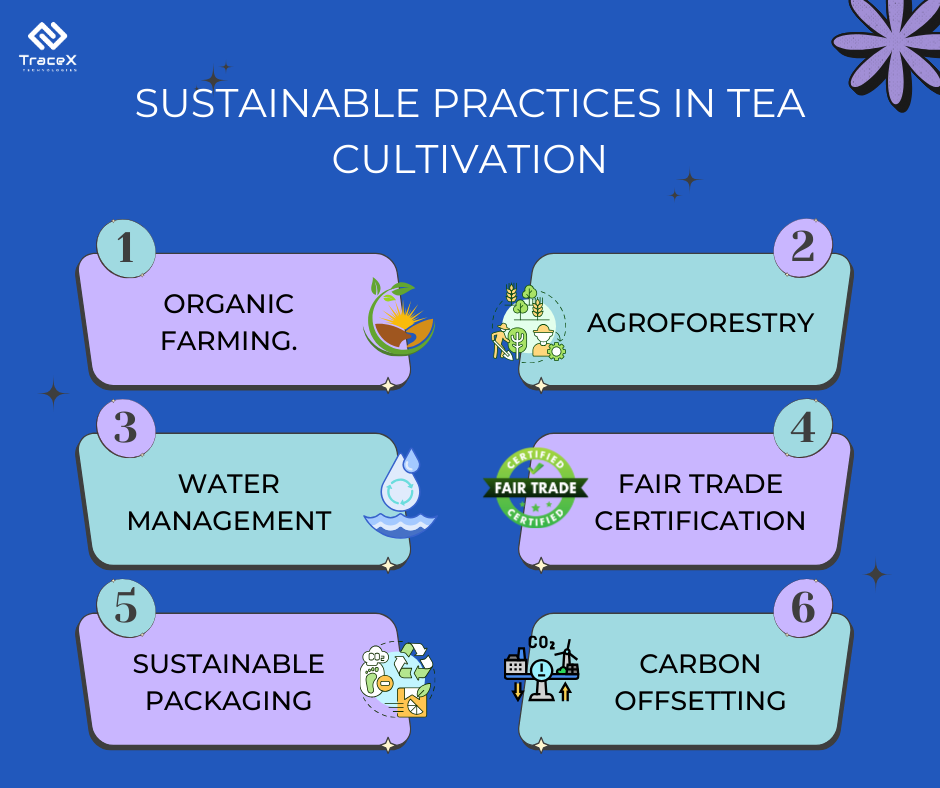Contact: +91 99725 24322 |
Menu
Menu
Quick summary: Discover the key challenges in tea sustainability, from climate impact and fair wages to traceability. Learn how the industry can adopt sustainable practices for a greener future.

Did you know that your daily cup of tea could be impacted by climate change and unsustainable farming practices? As the global demand for a sustainable and ethical tea grows, the tea sustainability is a mounting challenge.
For many tea producers, adapting to sustainable practices isn’t just about choice—it’s a necessity for survival. Climate change is disrupting traditional growing seasons, reducing yields, and impacting the quality of tea crops, while soil degradation and water scarcity add further strain. Without urgent action, the tea industry risks losing not only its environmental balance but also its ability to support the communities that rely on it.
The tea value chain encompasses all stages involved in producing tea, from cultivation to consumption.
Cultivation: Tea cultivation begins with planting and nurturing tea bushes in suitable climates and soil conditions. This stage involves various agricultural practices to ensure optimal growth and yield.
Harvesting: Once the tea bushes reach maturity, skilled workers hand-pluck the tender leaves and buds, often in multiple rounds throughout the year. The timing and method of harvesting can significantly impact the flavour and quality of the tea.
Processing: The harvested tea leaves undergo processing, which typically involves withering, rolling, oxidation (fermentation), drying, and sorting. Each tea type (e.g., green, black, oolong) requires specific processing techniques to achieve its desired flavour profile.
Packaging: After processing, the tea is packaged into various forms, including loose-leaf tea, tea bags, or ready-to-drink formats. Packaging also involves labelling and branding to communicate product information and attract consumers.
Distribution: Tea products are then distributed to wholesalers, retailers, or directly to consumers through various channels, such as supermarkets, specialty tea shops, online platforms, or tea rooms.
Consumption: Finally, consumers purchase and enjoy tea either at home, in cafes and restaurants, or on the go. The tea-drinking experience encompasses brewing, serving, and savouring the diverse Flavors and aromas of different teas.
Sustainability is critical in the tea value chain for environmental reasons, social responsibility, and economic viability. Throughout the value chain, sustainability practices, including eco-friendly cultivation methods, fair labour practices, and ethical sourcing, play an increasingly vital role in meeting consumer demand for responsibly produced tea.
Tea sustainability faces a unique set of challenges as the industry strives to balance environmental health, economic viability, and social responsibility.
Addressing these challenges requires coordinated efforts across the tea industry, from investing in climate-smart agricultural practices to supporting fair labor standards and implementing transparent, traceable supply chains. Sustainable tea production not only ensures a more resilient future for the industry but also provides consumers with a product they can trust to be both ethically and environmentally responsible.

Sustainability in tea production is about making sure our beloved tea is grown in ways that are good for the planet, the farmers, and everyone involved in the process. But what does that really mean? It’s about finding a balance between producing high-quality tea and protecting the environment, supporting farmers, and meeting the growing demand for sustainable products.
Sustainable tea production is about making sure every sip supports a healthy environment and a fair livelihood for those who grow it. It’s about keeping the tea industry thriving while ensuring that we’re giving back to the planet and people. So, next time you enjoy a cup of tea, think about all the effort that goes into making it sustainable protecting the land, respecting the people, and bringing you a tea that’s truly worth savoring.
Technology solutions play a transformative role in addressing challenges across the tea value chain by improving transparency, sustainability, and efficiency.
Technology like blockchain provides end-to-end traceability, tracking tea from farm to shelf. This transparency helps tea companies prove that their products are ethically sourced and free from harmful practices. With detailed tracking, consumers can trust that the tea they buy aligns with their values, and companies can comply with regulations that require proof of sustainable sourcing.
Climate change is impacting tea production heavily, with unpredictable weather and rising temperatures affecting yields and quality. Data-driven solutions, such as IoT sensors, help monitor soil moisture, temperature, and crop health, enabling farmers to make precise, climate-adaptive decisions. By using climate-smart agricultural practices guided by real-time data, tea producers can reduce resource waste and increase resilience to weather shifts.
Technology can optimize how water, fertilizer, and pesticides are used on tea farms. Smart irrigation systems, for example, deliver just the right amount of water based on soil conditions, reducing water waste and minimizing the risk of soil degradation. Similarly, satellite monitoring can analyze soil health over time, allowing farmers to adopt more sustainable practices that maintain soil fertility.
Digital platforms streamline communication across the supply chain, improving wage transparency and contract management. For smallholders, digital financial solutions can provide access to credit and mobile payments, helping ensure fair wages and timely payments. Worker apps also allow laborers to report unsafe conditions or unfair practices, promoting accountability within the workforce.
Technology simplifies the certification process, whether it’s for organic, fair trade, or sustainability standards. Blockchain and digital ledgers can store certification records, making it easier for producers to show compliance with standards and for auditors to verify them. This also helps tea companies manage the cost of certification and maintain certifications in a streamlined way.
Many tea farms are small, family-run operations that struggle with limited resources and market access. Digital platforms connect these farmers to larger markets, provide training on sustainable practices, and offer insights into demand and pricing. This helps smallholders secure fairer prices and makes it easier for them to adopt sustainable techniques without bearing high costs.
By integrating analytics and tracking solutions, companies can reduce waste across the value chain. For example, tracking packaging, transport, and storage conditions can prevent spoilage and ensure that the product maintains quality. Additionally, some tea companies are exploring circular practices, where technology can support recycling packaging materials and reducing overall waste.
Technology simplifies the complex procurement processes in the tea industry, allowing for faster and more efficient sourcing. Digital procurement platforms connect tea buyers directly with verified producers, ensuring that each batch meets quality and sustainability standards. These platforms provide real-time updates on inventory levels, pricing, and quality metrics, which enables companies to make informed purchasing decisions, reduce lead times, and respond quickly to market demands. Streamlined procurement also helps minimize risks of supply chain disruptions, ensuring a steady supply of ethically sourced tea.
TraceX stands out as a differentiator in solving traceability and procurement challenges in the tea value chain by delivering a holistic, blockchain-enabled platform that addresses both transparency and efficiency needs at every stage of the supply chain.
1. End-to-End Traceability with Blockchain Integrity: Unlike many systems that capture only partial data, TraceX offers end-to-end traceability, tracking tea from the farm to the final product with immutable blockchain records. This comprehensive visibility into every batch’s journey—covering origin, farming practices, quality, and certifications—provides tea companies and consumers with authentic and verifiable product histories.
2. Real-Time Data for Proactive Decision-Making: TraceX’s mobile-enabled platform allows farmers and suppliers to enter real-time data, making information accessible instantly across the supply chain. This real-time tracking empowers tea companies to monitor quality, adjust operations swiftly, and ensure compliance with high sustainability standards, supporting prompt, data-backed decision-making.
3. Streamlined Procurement: By connecting tea producers and buyers on a single platform, TraceX revolutionizes the procurement process. Buyers can evaluate supplier profiles, review farming practices, check certifications, and make informed purchasing decisions with confidence. This approach builds trust, supports fair pricing negotiations, and helps companies secure high-quality, sustainably sourced tea more efficiently.
4. Simplified Compliance and Certification Management: With built-in features for storing and tracking compliance data, TraceX takes the hassle out of regulatory adherence. From EUDR to Rainforest Alliance and fair-trade certifications, the platform provides an organized, accessible record of compliance data that makes audits seamless and ensures that each tea batch aligns with ethical and environmental standards.
5. Data-Driven Insights for Sustainable Growth: Beyond traceability and compliance, TraceX empowers tea companies to leverage insights into yield, quality, and market trends. These insights help companies optimize procurement strategies, manage inventory better, and respond effectively to demand changes, ultimately enabling a more resilient and sustainable supply chain.
TraceX doesn’t just digitize the supply chain; it transforms it, enabling tea companies to meet the growing demand for transparency, sustainability, and efficiency. This end-to-end approach—integrating traceability, procurement, compliance, and analytics—sets TraceX Farm Management platform apart as the go-to solution for tea companies committed to sustainable and ethical sourcing.
In addressing the challenges of tea sustainability, it’s clear that significant collaboration, innovation, and commitment are needed. From managing climate impacts and reducing resource use to empowering smallholder farmers and ensuring fair wages, the tea industry faces a complex but achievable path forward. By implementing sustainable practices, harnessing technology, and prioritizing ethical sourcing, tea producers can not only meet market demands but also ensure a brighter, more sustainable future for the industry, the environment, and the communities it supports.
Tea production faces significant environmental challenges, including high water and energy use, soil erosion, deforestation, and pesticide pollution. Sustainable practices and eco-friendly technologies are crucial to reducing these impacts.
Fair trade ensures that tea producers, especially smallholder farmers, receive fair wages and work in decent conditions. It promotes ethical sourcing, social welfare, and community development, which are vital for long-term sustainability in the tea industry.
Technology enhances traceability, streamlines procurement, optimizes resource use, and provides data-driven insights to monitor and improve sustainability across the tea supply chain.
